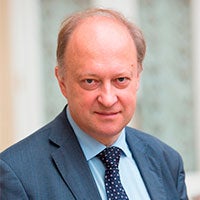 Integral to the founding of CERES in 1959 was an understanding of the many-layered relationship that existed between the Soviet Union and the United States, and to this day, the importance of Moscow-Washington dynamics has remained evident. On September 30, CERES Director Dr. Angela Stent, supported by the Carnegie Corporation, hosted Russian International Affairs Council Director General Andrey Kortunov for our Russia Futures dialogue series to more thoroughly explore Russian leadership’s likely response to the 2020 US Presidential Election.
Integral to the founding of CERES in 1959 was an understanding of the many-layered relationship that existed between the Soviet Union and the United States, and to this day, the importance of Moscow-Washington dynamics has remained evident. On September 30, CERES Director Dr. Angela Stent, supported by the Carnegie Corporation, hosted Russian International Affairs Council Director General Andrey Kortunov for our Russia Futures dialogue series to more thoroughly explore Russian leadership’s likely response to the 2020 US Presidential Election.
To watch the event in full, go to our YouTube channel. Read a summary of the event below:
Since 2011, Dr. Kortunov has been the Director General of RIAC. He is a member of expert and supervisory committees and boards of trustees of several Russian and international organizations. His academic interests include contemporary international relations and Russian foreign policy.
Kortunov first set out to clarify his position that the US Elections constituted a source of minimal urgency for Vladimir Putin and the Russian establishment, especially given the high likelihood that relations between the US and Russia would remain bitter regardless of the outcome. He cited three critical factors in his assessment of the Russian perspective on this matter: the extent to which the Trump administration was a friend to Russia, the extent to which Biden might worsen the status quo, and what could be done to improve the Russo-American relationship.
In addressing the first of these factors, Kortunov dispelled a number of conventional beliefs held by a critical mass of American punditry, foremost among these that Donald Trump is either willfully or unwittingly a pro-Russian stooge. While acknowledging some surface-level similarities as transaction-oriented executives with authoritarian tendencies, he stressed the necessity of divorcing Trump’s friendly rhetoric with his aggressive diplomacy in adjudicating his net impact on Russo-American dynamics from 2016 to the present. From facilitating the obsolescence of summitry as an avenue of inter-executive negotiation and rapid dissolution of American diplomacy on the consular and ambassadorial level, to the breakdown of traditionally stable areas of cooperation like strategic arms control, the Trump administration has acted in ways highly contrary to its representation in the press. Importantly, these actions were initiated irrespective of partisan and congressional pressures, although their role cannot be ignored in how the status quo came to be.
This rather harsh diplomacy naturally raises questions about the potential for improvements in the Russo-American relationship under a Biden administration. On this, Kortunov predicted anything between mixed and even worse results. While a Biden victory would likely mean a quieting of complaints about Russian interference in elections (regardless of its negligible impact), it could introduce a higher degree of diplomatic professionalism and a willingness to return to cooperation on strategic arms control, Russia’s political establishment also has much to fear. Sources of concern include greater awareness of and engagement in Russia’s near abroad (esp. Ukraine), the revival of a trans-Atlantic partnership capable of limiting Russian maneuverability, and most notably, an expansion of sanctions Trump has largely minimized to avoid international economic disruption.
The final consideration informing Russia’s response to the US elections, necessary steps to improving Russo-American relations, highlights two such conditions. The first of these required changes in Russian behavior, namely diplomatic outreach to political institutions in the United States beyond the executive branch, especially the American public itself, in order to improve its image and standing in the international community. The other condition, again contrary to punditry, was strong US leadership. Kortunov argued that even if unfriendly, Russia’s political establishment usually preferred cooperating with stable and predictable American policy and policymakers, citing the Eisenhower and Reagan periods in underscoring the possibility of a functional diplomatic relationship. That said, such an image of strength appears unlikely while American polarization remains at a fever pitch.
Kortunov took a number of questions from the audience, including those on the efficacy of sanctions, the role of China in the Russo-American relationship, and strategic arms control. To watch the event in full, go to our YouTube channel.